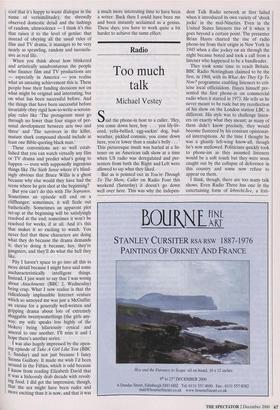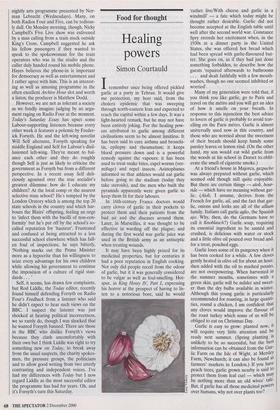Radio
Too much talk
Michael Vestey
Said the phone-in host to a caller, 'Hey, you come down here, boy . . . you lily-liv- ered, yella-bellied, egg-suckin' dog, bad- weather, pickled commie, you come down here, you're lower than a snake's belly . . . ' This picturesque insult was hurled at a lis- tener on an American talk show at a time when US radio was deregulated and pre- senters from both the Right and Left were allowed to say what they liked.
But as is pointed out in You're Through To The Show, Caller on Radio Four this weekend (Saturday) it doesn't go down well over here. This was why the indepen- dent Talk Radio network at first failed when it introduced its own variety of 'shock jocks' in the mid-Nineties. Even in the United States listeners tire of it when it goes beyond a certain point. The presenter Brian Hayes charted the rise of radio phone-ins from their origin in New York in 1945 when a disc jockey on air through the night became bored and took a call from a listener who happened to be a bandleader.
They took some time to reach Britain. BBC Radio Nottingham claimed to be the first, in 1968, with its What Are They Up To Now? programme enabling listeners to crit- icise local officialdom. Hayes himself pre- sented the first phone-in on commercial radio when it started in 1973. He tells us he never meant to be rude but my recollection of his show on the London station LBC is different. His style was to challenge listen- ers on exactly what they meant; as many of them didn't know precisely, they would become flustered by his constant opinionat- ed interruptions. At the time I thought he was a ghastly left-wing know-all, though he's now mellowed. Politicians quickly took to phone-ins as they assumed listeners would be a soft touch but they were soon caught out by the collapse of deference in this country and some now refuse to appear on them.
I think, though, there are too many talk shows. Even Radio Three has one in the entertaining form of lebrechtlive, a fort- nightly arts programme presented by Nor- man Lebrecht (Wednesdays). Many, on both Radios Four and Five, can be tedious- ly dull. On Monday morning, though, Nicky Campbell's Five Live show was enlivened by a man calling from a train stuck outside King's Cross. Campbell suggested he ask his fellow passengers if they wanted to speak to the spokeswoman for the train operators who was in the studio and the caller duly handed round his mobile phone. Hayes believes the phone-in is important for democracy as well as entertainment and I rather agree with him. This is an interest- ing as well as amusing programme in the often excellent Archive Hour slot and worth a listen; the producer is Matthew Dodd.
However, we are not as tolerant a society as we fondly imagine judging by an argu- ment raging on Radio Four at the moment. Today's Saturday Essay has upset some Labour-supporting listeners because every other week it features a polemic by Freder- ick Forsyth. He and the left-wing novelist Will Self alternate, Forsyth speaking for middle England and Self for Labour's disil- lusioned left-wing. They're meant to bal- ance each other and they do roughly though Self is just as likely to criticise the government as Forsyth but from a different perspective. In a recent essay Self deli- ciously agonised over the true socialist's greatest dilemma: how do I educate my children? At the local comp or the nearest selective state school? He's tempted by the London Oratory which is among the top 20 state schools in the country and which har- bours the Blairs' offspring, feeling an urge to 'infect them with the bacilli of non-con- formity' but he's put off by the school's so- called reputation for 'hauteur'. Frustrated and confused at being attracted to a less successful school elsewhere which has fall- en foul of inspections, he says bitterly, 'Nothing marks out the Prime Minister more as a hypocrite than his willingness to seize every advantage for his own children while allowing his government to continue the imposition of a culture of rigid stan- dards.
Self, it seems, has drawn few complaints, but Rod Liddle, the Today editor, recently found himself defending Forsyth on Radio Four's Feedback from a listener who said he didn't expect to hear such views on the BBC. I suspect the listener was just shocked at hearing political incorrectness, we so rarely do, though I was shocked that he Wanted Forsyth banned. There are those in the BBC who dislike Forsyth's views because they clash uncomfortably with their own but I think Liddle was right to try something new on Today, to break away from the usual suspects, the charity spokes- men, the pressure groups, the politicians and to allow good writing from two utterly contrasting and independent voices. I've had my differences with Today but I now regard Liddle as the most successful editor the programme has had for years. Oh, and it's Forsyth's turn this Saturday.



















































































 Previous page
Previous page